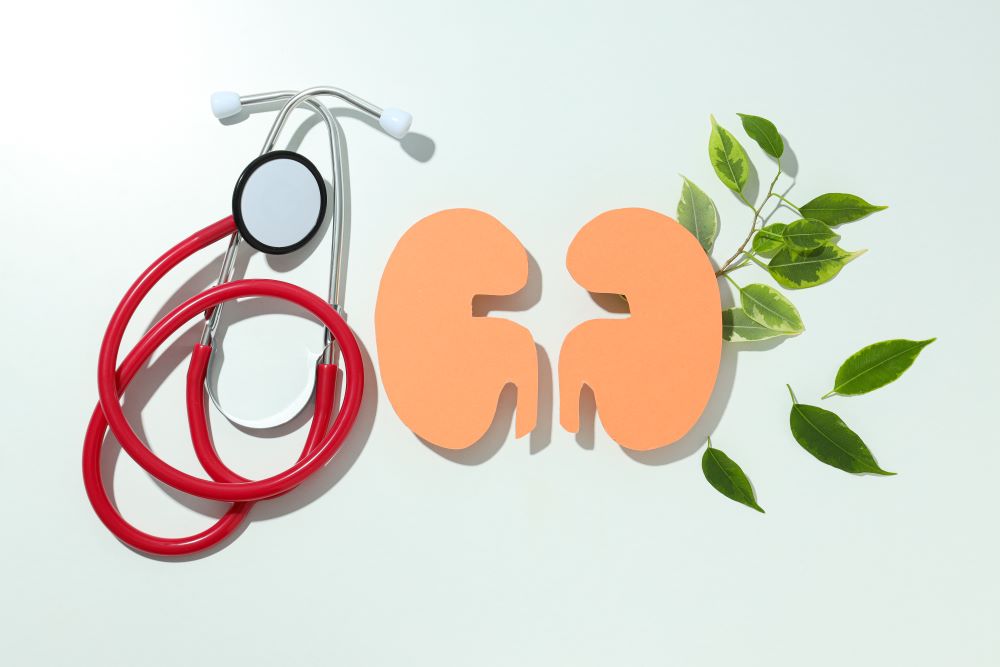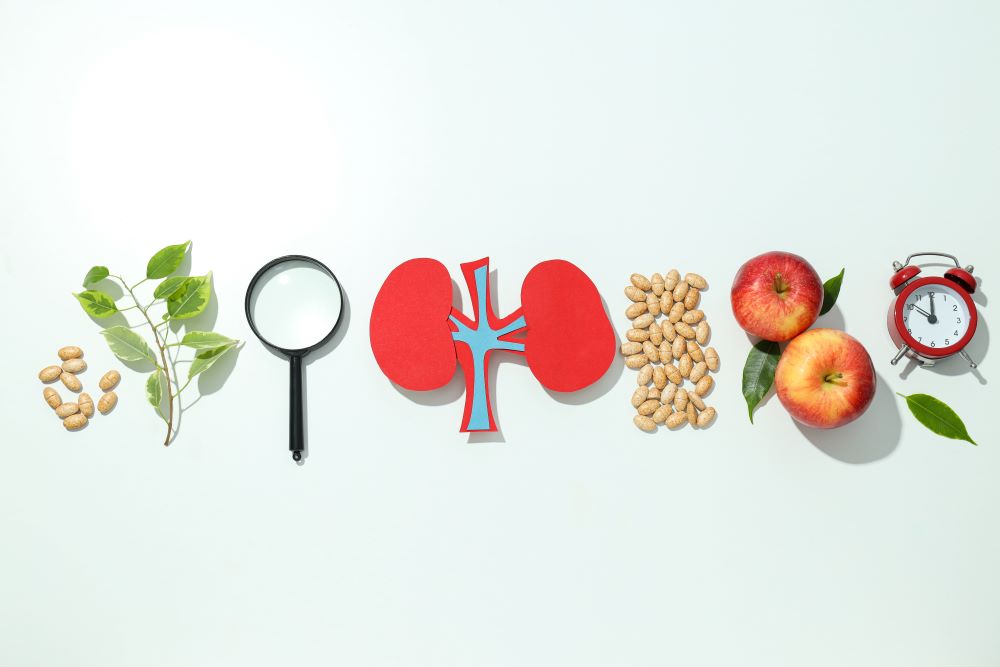What Vitamins & Supplements are Good for Kidney Health?

A balanced intake of vitamins for kidneys are essential for the overall health of these small yet vital organs. Kidneys help in the removal of toxins by filtering the blood. Moreover, they also help maintain the right amount of electrolytes by adjusting water, minerals, and salts.
Take a look below at some of the vitamins that help kidneys and the role they play.

Table of Contents

Best Vitamins & Supplements for Kidney Health
Maintaining optimal kidney health is crucial for overall well-being, and certain vitamins play a significant role in supporting kidney function and preventing related disorders. Here are some of the best vitamins and supplements for better kidney health
Best Sources of Essential Vitamins & Supplements for Kidney Health

Given below are the top sources of essential vitamins and supplements specifically beneficial for maintaining and enhancing kidney health:
Daily Intake of Vitamins & Supplements for Healthy Kidney
A balanced intake of vitamins and supplements is crucial for kidney health. Below is a table detailing the daily recommended intake limits for various vitamins and supplements:
Role of Vitamins & Supplements for a Healthy Kidney
Vitamins and supplements are crucial in maintaining kidney health by supporting various bodily functions and preventing deficiencies. Below are the benefits of each vitamin and supplement for kidney health.
How to Support Kidney Health in Your Daily Routine?

Maintaining kidney health is essential for overall well-being. Here are some effective strategies to support and enhance the function of your kidneys:
- Stay Hydrated: Drinking plenty of water helps your kidneys clear sodium and toxins, significantly lowering the risk of developing chronic kidney disease. Aim for at least 8 glasses of water daily.
- Eat a Balanced Diet: Incorporate plenty of fruits, vegetables, whole grains, and lean proteins into your diet. Reducing sodium, processed foods, and added sugars can help prevent kidney damage and maintain healthy kidney function.
- Regular Exercise: Engaging in physical activity helps maintain a healthy weight, reduce blood pressure, and lower the risk of kidney disease. Aim for at least 30 minutes of moderate exercise most days of the week.
- Avoid Overuse of Painkillers: Nonsteroidal anti-inflammatory drugs (NSAIDs) like ibuprofen can cause kidney damage if taken too frequently. Use these medications sparingly and under the guidance of a healthcare professional.
- Monitor Blood Pressure and Blood Sugar: High blood pressure and diabetes are leading causes of kidney damage. Regularly check and manage your blood pressure and blood sugar levels to keep your kidneys healthy.
- Avoid Smoking and Limit Alcohol: Smoking reduces blood flow to the kidneys, while excessive alcohol intake can lead to high blood pressure and kidney damage. Quit smoking and limit alcohol consumption to protect your kidneys.
- Regular Check-Ups: Routine medical check-ups can help detect kidney problems early, ensuring timely treatment and management. Discuss any risk factors or concerns with your healthcare provider to stay proactive about kidney health.
How to Boost Vitamin Levels for Kidney Health?

Optimising vitamin levels is crucial for supporting kidney function and preventing related diseases. Here are some effective ways to ensure your kidneys get the vitamins they need:
- Incorporate Vitamin Rich Foods: Include a variety of fruits and vegetables in your diet, such as citrus fruits, berries, leafy greens, and bell peppers. These foods are high in essential vitamins, which support kidney health and reduce kidney stone risk.
- Take Vitamin Supplements: Consider taking supplements if you have a deficiency or specific dietary restrictions. Vitamins like D and B-complex are essential for kidney health, but always consult a healthcare provider before starting any new supplement.
- Monitor Vitamin Intake with Kidney Disease: If you have chronic kidney disease, be mindful of your vitamin intake. Some vitamins, like vitamin A, can build up to harmful levels. Consult your healthcare provider to avoid excessive intake.
- Proper Vitamin D Intake: Exposure to sunlight helps your body produce vitamin D, which is crucial for calcium absorption and kidney function. Spend some time in the sun daily, but always use sunscreen to protect your skin.
- Avoid Excessive Processed Foods: Processed foods can be high in phosphorus and potassium, harming kidneys in large amounts. Opt for fresh, whole foods to maintain a balanced intake of these minerals and support overall kidney health.
Vitamin Deficiency Diseases Linked to Poor Kidney Health
- Vitamin D deficiency can lead to secondary hyperparathyroidism, resulting in weakened bones and an increased risk of fractures due to impaired calcium absorption.
- Lack of vitamin B12 can cause anaemia, leading to fatigue, weakness, and reduced kidney function over time, exacerbating chronic kidney disease.
- Insufficient vitamin C can impair collagen production, weakening blood vessels and connective tissues in the kidneys, increasing susceptibility to kidney damage.
- Low levels of vitamin E can contribute to oxidative stress and inflammation, accelerating the progression of chronic kidney disease and kidney failure.
- Folic acid deficiency can result in elevated homocysteine levels, which can damage blood vessels and increase the risk of cardiovascular disease, negatively impacting kidney health.
- A lack of vitamin A can lead to immune system deficiencies, making the kidneys more vulnerable to infections and inflammation, which can further deteriorate kidney function.
Effects of Long-term Vitamin Deficiency on Kidney
Long-term vitamin deficiency can have severe consequences on kidney health. A lack of vitamin B12 can cause anaemia, leading to fatigue and reduced kidney function. Vitamin C deficiency impairs collagen production, weakening the blood vessels and connective tissues in the kidneys, making them more susceptible to damage.
Moreover, low levels of vitamin E can lead to oxidative stress and inflammation, accelerating chronic kidney disease progression. Folic acid deficiency can elevate homocysteine levels, damage blood vessels, and increase cardiovascular risks, negatively impacting the kidneys. Additionally, a lack of vitamin A can compromise the immune system, making the kidneys more prone to infections and further deterioration in function.
Which Vitamins Help Detox Your Kidneys?
Besides knowing which vitamins support kidney function, understanding which vitamins help cleanse your kidneys is also worthwhile. Vitamins B2 (riboflavin) and B6 (pyridoxine) are crucial in maintaining clean and healthy kidneys. Vitamin B2 aids in the body's detoxification processes, helping to eliminate waste and toxins that can burden the kidneys.
Vitamin B6 is essential for preventing kidney stones by reducing oxalate levels in the urine, which can form stones. Together, these vitamins contribute to maintaining a clean and efficient renal system.
Which Vitamin Deficiency Is Harmful to Your Kidney Functioning?
Vitamins for kidneys are essential for proper functioning. However, in a low amount, they can cause harm to the organ. Take a look at some of the vitamins which are essential for kidneys and can cause damage to the kidneys if present in low amounts.
- For instance, a lack of vitamin B6 results in kidney stones.
- Lack of vitamin D, which the kidneys help to convert to its active form, implies the beginning of kidney failure.
Should You Take a Kidney Health Supplement?
Deciding to take a kidney health supplement depends on your health status and diet. Supplements like vitamin D and B-complex vitamins can benefit those with chronic kidney disease or at risk. Always consult a healthcare provider before starting any supplements to ensure they are safe.
Supplements can help address nutrient deficiencies but should not replace a balanced diet and healthy lifestyle. Proper hydration, nutrient-rich foods, and limiting processed foods and sodium are crucial for kidney health. A healthcare professional can guide you in finding the right balance.
Maintaining adequate vitamin levels is essential for optimal kidney health. Vitamins such as D, B12, C, E, and folic acid play significant roles in supporting kidney function, preventing deficiencies, and mitigating the risk of kidney-related diseases. While supplements can be beneficial, they should complement a balanced diet and healthy lifestyle.
In conclusion, the best vitamins for kidney health are D and Bs, such as B6, B12, etc. When you take vitamins for kidneys, always consult with your doctor or a nutritionist for the exact dosage.













